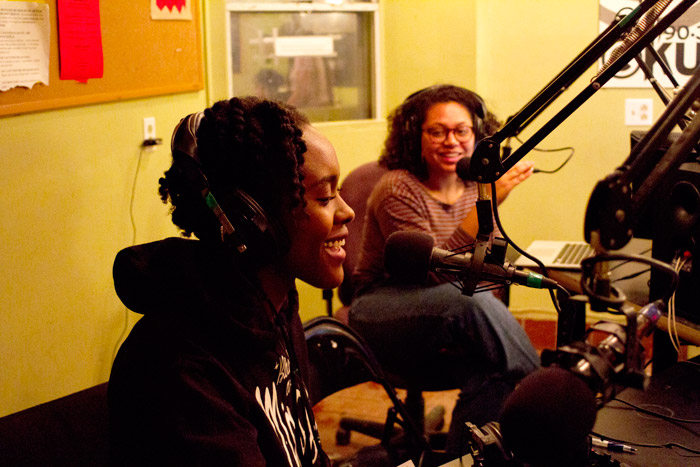On Monday, Feb. 15, Black Students’ Network (BSN) collaborated with CKUT 90.3 FM to produce Black Talk, thirteen hours of afrocentric radio programming. As part of their Black History Month series, the BSN-involved McGill students and Montreal locals alike fostered conversations on the black experience and issues within the black community.
The program was founded by McGill students in the BSN in 1987, yet Black Talk’s disappearance in 1996 meant the program was kept under the radar of the BSN executive until this year. It was only after serendipitously finding remnants of the program in its office, including an old poster and tapes of recorded segments, that the BSN decided to revitalize the program.
“We were cleaning up our office, and we found a lot of documentation, a lot of posters for stuff that [the BSN] had done before,” Isabelle Oke, U2 Arts and BSN External Coordinator, recalled. “One of them was Black Talk […] and we got inspired to try it out again.”
Because the BSN executive had limited knowledge of what Black Talk programming consisted of in the 1980’s and 1990’s, they took their own approach to choosing content to dedicate air time to, rather than limiting their programming to that which had been done in the past. The BSN held a call-out for volunteers to host programs on the topic of their choosing, empowering students and community members to contribute to the discussion on the black experience in Canada.
“We didn’t actually find the schedule from the last Black Talk,” Oke said. “We approached the programming this year [by] trying to have a mixture of community organization [and] personalities [talking about] topics brought forward by students, and some historical content. We also just tried to give air time to anyone who wanted it, which wasn’t a problem because everyone had really interesting stuff to talk about.”
The BSN hoped to bring the program back to life this year and re-establish it as an annual occurrence.
“The struggle right now is just trying to connect what it was into what it is now,” Michelle Blassou, U2 Arts and BSN Social Coordinator, said. “Hopefully it’ll revive back up and it’ll grow to what it used to be.”
To pay proper homage to the original Black Talk programming, Monday’s schedule included archived segments from versions of Black Talk that took place in the 1990’s. Among these was Hair Talk, a discussion on hair in the black community.
“Listening really helps to centre discussions and attitudes we have about hair today,” Oke said.
The guests on this archived program discussed the cultural and political implications of their choices of hairstyle. One guest explained that institutional systems of oppression put immense pressure on the hair styles of black women.
“The way society is now, we’re made to feel ashamed of not having 'good' hair,” a guest, Melanie, explained. “I began to feel like people have been brainwashed into thinking there is something wrong with the way their natural hair looks.”
Another guest noted that she felt as though wearing natural hair was a political statement of pride for her heritage.
“There came a point where I was like, ‘Yeah, I’m making a statement [with my hair], and I like the statement I’m making,’” she explained. “It’s a way for me to say that I am proud of my naturalness and my natural African heritage.”
The BSN also enlisted the help of Shanice Nicole, an ambassador at Four Brown Girls—an organization that aims to provide an outlet for empowerment and self-expression of women in the black community. She conducted a question-and answer-segment on sexual health in the black community. By holding a call-out for queries from the community, the BSN was able to answer questions that students found relevant in an anonymous manner.
The overarching goal of these programs was to create space for marginalized voices in the McGill and greater Montreal communities, and to spark dialogue on the black experience among students and locals.
“Black Talk was probably founded because of an absence of these kinds of things on campus [in the 1980’s],” Blassou said. “I think Black History Month is a good opportunity to see something like this—black-centric programming. But at the same time, this is the only time we’ll see programming like this, so there’s really a need for these kinds of conversations on campus and [a need] to foster this kind of community.”
Oke quoted a professor at McGill, Rachel Zellers, who noted that building this conversation composed of black voices talking about shared experiences is important in today’s cultural climate.
“Black people just seem to miss each other, and it just leads to a type of isolation in this space,” Oke quoted.
Furthermore, CKUT’s mandate aims to bring light to voices that are silenced in Western society, which makes for a strong collaboration with the BSN.
“[CKUT] is an awesome partnership just because [ours] are the kind of voices that they’re trying to prioritize,” Blassou said. “This is just a really different kind of collaboration for BSN, and hopefully it’ll pull in a different kind of audience. The nice thing about CKUT is that they have a really good following of a lot of people who [regularly] tune in, so it should be interesting to see how that expands our network.”
Ultimately, the organizers of Black Talk hoped to engage a wider audience of people at McGill and within Montreal in conversation about their lived experiences of racial oppression.
“There’s something […] covert about [the black experience in Canada],” Blassou said. “It’s not talked about a lot, so [it was nice to show] this is what it’s like here in Montreal, this is what it’s like at McGill.”








